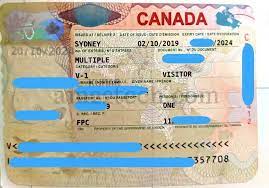Tourist Visa for Canada

Canada, known for its breathtaking landscapes, vibrant cities, and friendly locals, is a top destination for travelers worldwide. Whether you’re eager to explore the stunning Rocky Mountains, visit cosmopolitan cities like Toronto and Vancouver, or experience the unique culture and history of Quebec, obtaining a tourist visa for Canada is the first step in making your dream trip a reality. This article will guide you through the essential details of acquiring a tourist visa for Canada, including eligibility criteria, application procedures, required documents, and useful tips to ensure a smooth and successful process.
Understanding the Tourist Visa (Temporary Resident Visa – TRV)
The tourist visa for Canada is officially known as the Temporary Resident Visa (TRV). This visa allows individuals to enter Canada for tourism purposes for a specified period, usually up to six months. It’s crucial to understand that a TRV is different from other types of visas such as work or study permits. The TRV strictly permits leisure activities, family visits, and general tourism, but does not authorize you to work or study.
Eligibility Criteria for a Tourist Visa
Before applying for a tourist visa to Canada, it’s important to ensure that you meet the eligibility criteria set by the Canadian government. The key requirements include:
- Valid Passport: You must possess a valid passport that remains effective throughout your stay in Canada.
- Good Health: Some applicants may need to undergo a medical examination to prove they are in good health.
- No Criminal Record: A clean criminal record is mandatory. You may be required to provide a police clearance certificate.
- Proof of Funds: You must demonstrate that you have sufficient funds to cover your stay in Canada.
- Ties to Home Country: Applicants must show strong ties to their home country, such as a job, home, financial assets, or family, to ensure they will return after their visit.
- Purpose of Visit: Clearly state the purpose of your visit and provide a detailed travel itinerary.
Application Process for a Tourist Visa
The application process for a Canadian tourist visa involves several steps. Here’s a detailed overview to help you navigate through:
Step 1: Determine How You Will Apply
You can apply for a tourist visa online or on paper. Online applications are generally faster and more convenient. To apply online, you need to have a scanner or camera to create electronic copies of your documents and a valid credit card for payment.
Step 2: Gather Required Documents
Ensure you have all the necessary documents before starting your application. The required documents typically include:
- A Valid Passport: With at least one blank page other than the last page.
- Photographs: Recent passport-sized photos that meet the specifications.
- Proof of Funds: Bank statements, pay stubs, or other financial documents.
- Travel Itinerary: Flight tickets, hotel reservations, and travel plans.
- Letter of Invitation: If visiting family or friends, a letter from them is required.
- Supporting Documents: Evidence of employment, property ownership, or other ties to your home country.
Step 3: Complete the Application Form
Fill out the application form (IMM 5257) accurately. Any misinformation can lead to delays or rejection. For online applications, create an account on the IRCC (Immigration, Refugees, and Citizenship Canada) website and follow the instructions to complete the form.
Step 4: Pay the Visa Fee
The visa application fee must be paid online if applying electronically. The fee for a tourist visa is CAD $100, and an additional CAD $85 for biometric processing if required. EMERGENCY VISA FOR CANADA
Step 5: Submit Your Application
For online applications, submit your application electronically after uploading all documents and making the payment. For paper applications, mail your completed form and supporting documents to the appropriate Visa Application Center (VAC).
Step 6: Provide Biometrics
Most applicants need to provide biometrics (fingerprints and photo). You will receive a notification on when and where to give your biometrics after submitting your application.
Step 7: Attend an Interview (if required)
In some cases, you may be asked to attend an interview at the local consulate or embassy. This interview is to verify the information provided and assess your eligibility.
Processing Time and Decision
The processing time for a Canadian tourist visa can vary depending on the applicant’s country of residence and the time of year. Generally, it takes about 2-4 weeks, but it can be longer. You can check the status of your application online through your IRCC account.
Once a decision is made, you will be notified. If your visa is approved, it will be stamped inside your passport. In case of rejection, you will receive an explanation letter.
Preparing for Your Trip
After receiving your tourist visa, there are several steps you should take to prepare for your trip to Canada:
- Plan Your Itinerary: Finalize your travel dates, book accommodations, and plan activities.
- Purchase Travel Insurance: Ensure you have adequate travel insurance that covers medical emergencies, trip cancellations, and other unexpected events.
- Pack Accordingly: Canada has diverse weather conditions, so pack suitable clothing and essentials.
- Understand Canadian Customs and Laws: Familiarize yourself with Canadian customs, laws, and cultural norms to ensure a smooth and enjoyable trip.
Arriving in Canada
When you arrive in Canada, you will go through customs and immigration. Be prepared to show your passport, visa, and any supporting documents such as your itinerary or invitation letter. The border services officer will ask questions to confirm your intentions and determine your admissibility. If everything is in order, you will be allowed to enter Canada.
Extending Your Stay
If you wish to extend your stay in Canada beyond the period granted on your tourist visa, you must apply for an extension at least 30 days before your status expires. You will need to provide reasons for your extension, proof of funds, and other supporting documents. The extension is not guaranteed and is subject to approval by the Canadian immigration authorities.
Reapplying After a Visa Refusal
If your tourist visa application is refused, you can reapply. However, it’s important to address the reasons for the refusal before reapplying. Carefully review the refusal letter, gather additional supporting documents, and ensure that any previous issues are resolved.
Conclusion
Obtaining a tourist visa for Canada may seem daunting, but with proper preparation and understanding of the process, it can be a straightforward experience. From meeting the eligibility criteria and gathering the required documents to submitting a complete application and preparing for your trip, each step is crucial in ensuring a successful application. By following the guidelines provided in this article, you can embark on your Canadian adventure with confidence and excitement, ready to explore all the incredible attractions and experiences that this beautiful country has to offer.
